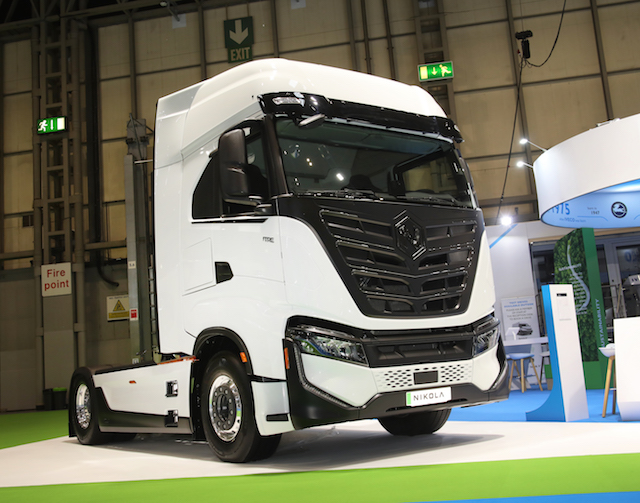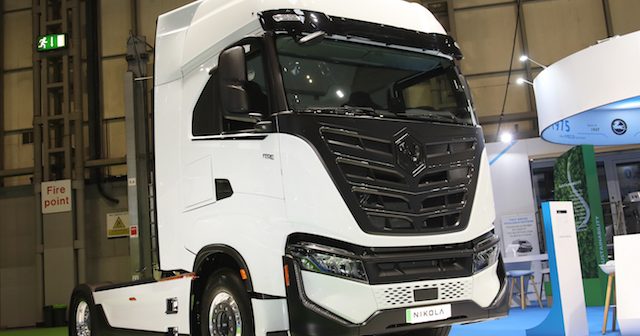The all-electric Nikola Tre BEV was seen for the first time in the UK on the IVECO stand at this year’s CV Show.
 Serving as one of the pioneers of electrified heavy goods vehicles, the Nikola Tre BEV 4×2 is designed for Europe and is packed full of innovative technology that helps it deliver impressive performance in tandem with zero emissions. A 738kWh battery pack – consisting of nine modular 82kWh batteries – powers its unique FPT Industrial e-Axle, producing 645 HP and 1,800Nm of instant torque.
Serving as one of the pioneers of electrified heavy goods vehicles, the Nikola Tre BEV 4×2 is designed for Europe and is packed full of innovative technology that helps it deliver impressive performance in tandem with zero emissions. A 738kWh battery pack – consisting of nine modular 82kWh batteries – powers its unique FPT Industrial e-Axle, producing 645 HP and 1,800Nm of instant torque.
Decarbonisation is a critical topic for many HGV fleets, and so delivering a highly capable solution that can compete with traditional combustion vehicles was a core objective. Extensive engineering has resulted in impressive rapid charging capabilities that allow the Tre BEV to go from 10-90% battery capacity in just 100 minutes. Being able to charge at up to 350kW means that the Nikola spends more time on the road and less time plugged in. A full charge gives this truck a range of up to 330 miles.
The spacious driver-centric cab combines strong ergonomics with the latest technology, keeping those behind the wheel comfortable and informed. Refinement versus a conventional truck is unrivalled, with engine noise and drivetrain vibrations totally absent, reducing fatigue.
A fully digital 12.8-inch driver’s display is packed full of useful driving data and clear graphics replaces traditional dials. This configurable screen is designed to help reduce cognitive load, serving as true aid to the driver. This driver-centric space is crowned with a huge 17-inch touchscreen infotainment system that is angled towards the driver. The screen’s expansive real-estate enables large easy to access icons and a wealth of supplementary information to be displayed. Plentiful storage, cosseting bed setups and optional creature comforts such as a refrigerator and microwave make this an electrified home away from home.
In addition to the environmental benefits an eHGV can deliver, they are also an impressive means to reduce the Total Cost of Ownership. EVs feature fewer moving parts than combustion models and very few consumables, meaning that serving and maintenance is notably cheaper. Additionally, their increased efficiency versus fossil-fuelled vehicles makes running an EV fleet cheaper, especially when combined with taking advantage of off-peak charging rates at HUB locations. Many cities around the world are creating low-emission zones to improve air quality, and so driving a zero-emissions vehicle will help operators avoid daily charges.























